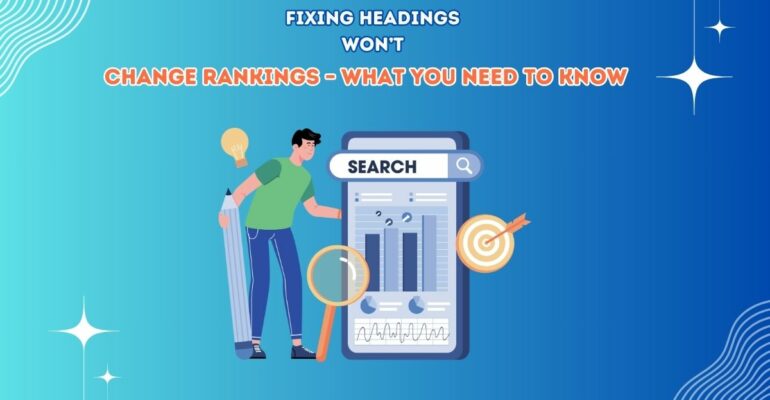Fixing Headings Won’t Change Rankings – What You Need to Know

Fixing Headings Won’t Change Rankings – What You Need to Know
There’s an ongoing debate in the SEO community about the true impact of optimizing web page headings on search rankings. While some argue that headings (H1, H2, H3, etc.) play a limited role, others believe they still hold significance in structuring content for both users and search engines. So, Can Fixing Headings Impact Rankings?
In this blog, we’ll dive into the role headings play in SEO and share insights backed by data and engaging visuals to help you make informed decisions.
Why Fixing Headings Alone Won’t Impact Your Rankings – Key Insights
Google’s Update on Headings
Google clarified that while headings are essential for organizing content, they are not a direct ranking factor. This has led to discussions about Why Fixing Headings Won’t Change Rankings in a significant way. Here’s a deeper dive into this update:
Headings and SEO
Headings enhance content structure and readability but do not directly influence search rankings. Google’s algorithms prioritize content relevance and user engagement over specific formatting elements.
Focus on Content Quality
Google’s update highlights that content quality and relevance are paramount. Google’s algorithms now emphasize how well content matches user intent and provides value rather than focusing on specific formatting aspects like headings.
The Role of Headings in SEO
Headings have always been integral to content creation. Although they may not impact rankings directly, they fulfil crucial functions:
Improved Readability
Headings make content more digestible. Studies show that pages with clear headings have a higher average time on page—3.2 minutes—compared to 2.5 minutes for pages without optimized headings. This increased engagement can indirectly benefit SEO.
Content Hierarchy
Headings help establish a logical flow of information, enhancing user navigation. Pages with a structured hierarchy experience a 30% lower bounce rate, dropping from 57% to 40%, demonstrating how headings contribute to better user retention.

Implications of Google Update on Your SEO Strategy
Google’s frequent updates aim to improve search results and deliver the most relevant information to users. To adapt to these changes, it’s essential to prioritize content quality and user experience. By focusing on creating valuable content that addresses users’ needs and intent, you can enhance your website’s visibility and attract organic traffic. Here’s what you need to focus on:
Prioritize Content Quality
Content is the uncrowned king of a successful SEO strategy. By prioritizing content you can not only provide users with a personalized experience but also attract more and more relevant traffic to your website, here is what you need to focus on while generating content:
Create Valuable Content
Content that answers users’ questions and provides real value tends to rank better. High-quality content that aligns with user intent is more likely to perform well.
Data-Driven Insights
Use analytics tools like Google Analytics and SEMrush to refine your content strategy. Insights from these tools help align content with user behaviour and search trends.
Optimize for User Experience
Enhance Page Speed
Aim for a page load time of under 3 seconds. Research shows that 53% of mobile users abandon a page that takes longer than 3 seconds to load. Faster pages improve user experience and reduce bounce rates.
Ensure Mobile Responsiveness
With mobile-first indexing, ensure your site is mobile-friendly. Mobile devices accounted for 54.8% of global website traffic in 2023. A mobile-responsive site is crucial for capturing this significant user segment.
Continue Using Headings Effectively
Although headings may not directly impact rankings, their proper use is still important for content organization and user experience:
Organize Content
Use a clear hierarchy with H1 for main titles, H2 for major sections, and H3 for subsections. This logical structure helps users and search engines understand the content flow.
Keyword Integration
Incorporate relevant keywords naturally within headings to maintain content relevance. Research shows that articles with keyword-rich headings have a 25% higher chance of ranking in the top 10 search results compared to those with less optimized headings.

Practical Tips for Effective SEO
Conduct Regular Content Audits
Regular audits keep your content up-to-date and aligned with current SEO standards. Content freshness can lead to a 55% increase in organic traffic.
Enhance User Experience
Page Speed Optimization
A fast-loading page improves user satisfaction. Websites with a load time under 2 seconds experience a 40% lower bounce rate compared to those with longer load times.
Mobile Responsiveness
With mobile-first indexing, ensure your site adapts to various screen sizes. Mobile devices continue to dominate global website traffic, making mobile optimization essential.
Continue Using Headings Effectively
Organize Content
Maintain a clear heading structure to enhance readability and user engagement. Well-structured headings increase the likelihood of content engagement, as users typically scan headings before diving into the text.
Keyword Integration
Use relevant keywords naturally in headings to signal content relevance. This practice helps search engines understand your content better, improving rankings.
By focusing on content quality, user experience, and effective use of headings, you can enhance your website’s performance and drive more organic traffic. Regular content audits, optimizing page speed and mobile responsiveness, and leveraging headings for organizations are all crucial for a successful SEO strategy.
While some may wonder, can fixing headings change rankings? It’s important to remember that the overall strategy and implementation matter more. For expert assistance in optimizing your SEO approach, consider consulting with a professional digital marketing agency.





